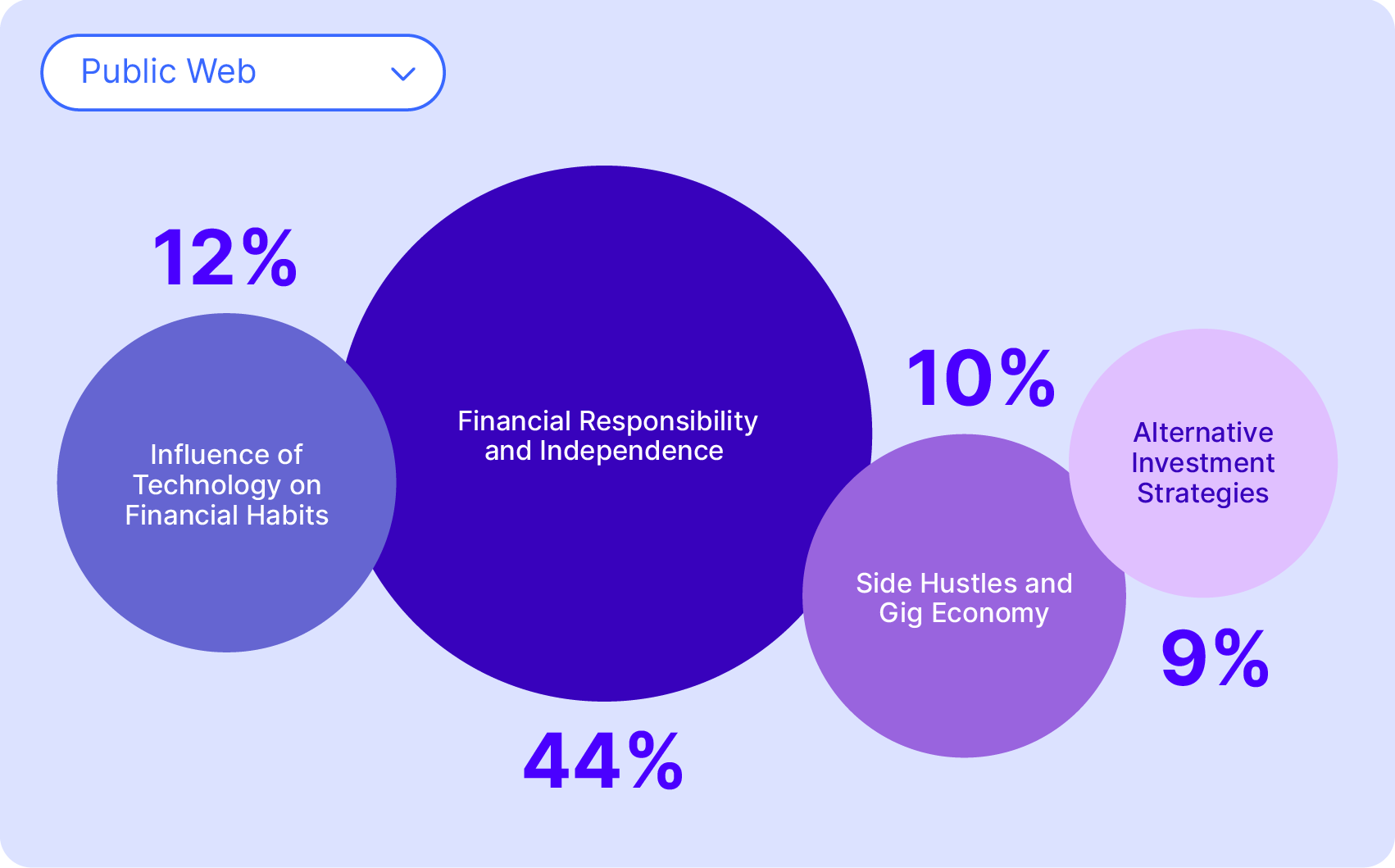 Image source: Your Company Name
Image source: Your Company Name
Understanding Gen Z’s Unique Economic Landscape
Generation Z, born roughly between 1997 and 2012, is stepping into a world that is markedly different from the one previous generations encountered. With technology at their fingertips and a shifting economic foundation, Gen Z’s financial landscape is characterized by a profound transformation in their attitudes towards money, savings, and investment strategies. This generation inherits the complexities of a global economy impacted by the aftermath of the financial crisis, a pandemic, and constantly evolving job markets.
Economic Challenges
Gen Z faces unique economic challenges. Having grown up during the Great Recession and the COVID-19 pandemic, many are navigating a landscape of high student loan debt, rising housing costs, and uncertain job prospects. According to a report by Pew Research Center, Gen Z is the most diverse and inclusive generation to date, which also influences their economic perspectives and priorities.
Emphasis on Financial Education
Unlike their predecessors, Gen Z values financial education and awareness. They are more likely to actively seek out information about managing finances, learning about topics such as budgeting, investing, and saving. Digital platforms offer them a wealth of resources, enabling them to take charge of their financial futures, as corroborated by findings from Zeta.
Technology Integration
The role of technology is indispensable in shaping Gen Z’s financial practices. This generation is equipped with smartphones and apps that allow for seamless transactions, budgeting, and investing. The rise of fintech solutions has made financial management more accessible, helping Gen Z to not only save but also invest with confidence. As the youngest generation of consumers, they are pioneers in the shift toward a fully digital economy.
Values-Driven Spending
Moreover, Gen Z is marked by a commitment to social responsibility—a trend that influences their buying habits. They tend to favor brands that align with their values, seeking transparent and ethical business practices. This shift represents a dramatic redefinition of consumerism focused not just on price and quality, but also on the impact of purchases.
In summary, Gen Z’s economic landscape is dynamically shaped by their collective experiences, values, and technological integration, pressing forward as a generation that prioritizes financial literacy, ethical spending, and innovative solutions to traditional financial challenges. As they mature into a more significant economic force, understanding their financial evolution becomes crucial for businesses aiming to connect with this influential demographic.
Gen Z and the Shift in Saving Habits
Why Gen Z Saves Differently from Previous Generations
The financial landscape has transformed significantly, and Gen Z is navigating this terrain with a refreshing approach to saving. Unlike previous generations, which were often driven by traditional notions of saving for the future, Gen Z emphasizes flexibility, purpose, and financial literacy. This generation, born roughly between 1997 and 2012, has grown up during a time of economic instability, including the Great Recession and the COVID-19 pandemic, leading to a more cautious and pragmatic mindset toward savings.
One of the primary reasons why Gen Z saves differently is their ability to identify and prioritize values. This cohort often saves for experiences and personal growth rather than merely accumulating wealth. According to a report from Bankrate, approximately 36% of Gen Z adults prefer to save for travel and experiences rather than traditional wealth accumulation methods. This reflects a shift in values, placing quality of life and personal fulfillment at the forefront.
Moreover, many members of Gen Z are motivated by social causes. They tend to save with goals that align with their personal and social values, such as sustainable living, giving to charity, and supporting local businesses. As such, their savings habits are becoming increasingly intertwined with their beliefs, illustrating a departure from the more rigid saving frameworks of previous generations.
The Role of Technology in Gen Z’s Savings Strategy
Technology plays a significant role in shaping how Gen Z approaches saving. With smartphones as an integral part of their lives, this generation utilizes a variety of financial apps and platforms to manage their savings. The ease of access to budgeting and saving tools makes financial management more streamlined and approachable. Features like automatic savings, gamified saving experiences, and AI-driven financial advice appeal particularly to this tech-savvy demographic.
Gen Z often uses apps such as Cash App, Qapital, and Chime, which offer automation features that help them save effortlessly. For instance, some apps allow users to round up purchases and save the spare change, making saving a daily habit without requiring significant effort. This approach aligns with Gen Z’s desire for simplicity and convenience in managing finances.
Additionally, social media platforms have become a valuable resource for financial education among Gen Z. Influencers and thought leaders share tips, saving strategies, and personal finance advice on platforms like TikTok and Instagram, making it easier for the younger generation to learn about financial literacy in an engaging format. As a result, the financial knowledge gap is narrowing, empowering Gen Z to make informed saving decisions.
In summary, the shift in saving habits exhibited by Gen Z is driven by their unique experiences, values, and an affinity for technology. They prioritize purpose-driven savings and leverage digital tools to create and maintain their financial strategies, setting a new precedent for future generations. For further insights on the financial habits of Gen Z, refer to this comprehensive study by The Center for Financial Services Innovation here.
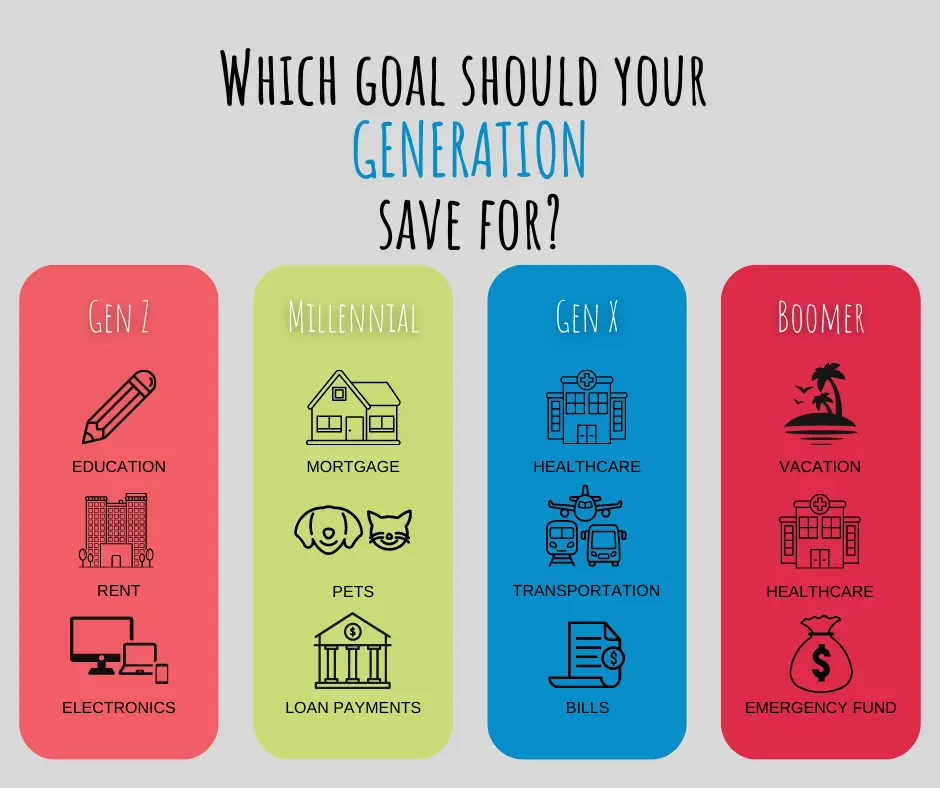 Image source: SmartyPig
Image source: SmartyPig
Investing Strategies: How Gen Z Approaches Wealth Building
Gen Z’s Favorites: Cryptocurrency, Stocks, and Socially Responsible Investing
As the financial landscape evolves, Generation Z is stepping in with a fresh perspective on wealth building. This emerging generation has unique investment preferences that prioritize innovation, accessibility, and social responsibility. Understanding these favorites will illuminate why Gen Z is reshaping traditional investment strategies.
Cryptocurrency tops the list as a favorite investment vehicle for Gen Z. Thanks to its potential for high returns and its appeal as a decentralized alternative to traditional finance, many Gen Z investors are enthusiastic about digital currencies such as Bitcoin and Ethereum. According to a recent study by Bankrate, over 25% of Gen Z investors report having invested in cryptocurrency, reflecting a significant trend toward diversifying portfolios with digital assets.
Next, stocks continue to play a crucial role in Gen Z’s investment strategies. Platforms like Robinhood have made it easier than ever for young investors to buy and sell stocks with minimal fees. Many in Gen Z gravitate towards technology stocks and trend-driven companies, aligning their investments with their interests and values. This approach to stock investing emphasizes a balance between growth potential and personal passion.
Moreover, socially responsible investing (SRI) has gained traction among Gen Z investors. This generation prioritizes ethical considerations in their financial decisions, often seeking investments that align with their values, such as climate change initiatives and diversity and inclusion efforts. By choosing SRI, Gen Z not only aims to secure financial returns but also fosters a positive impact on society and the environment.
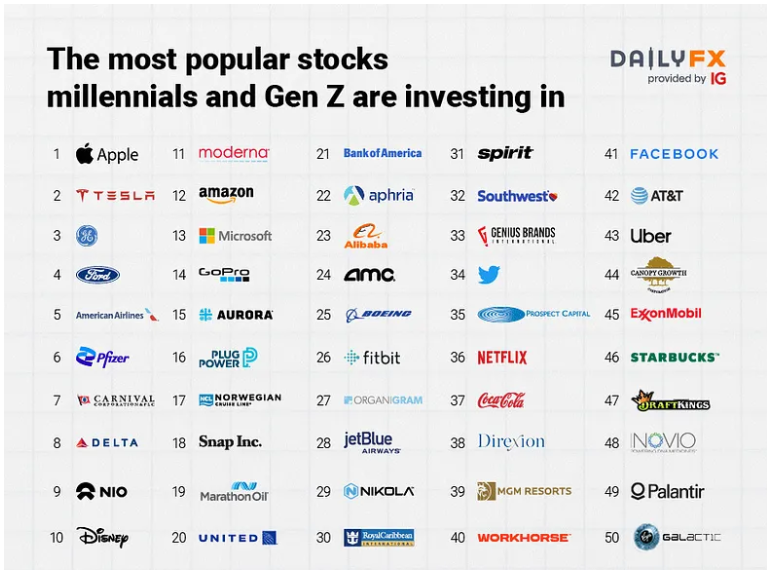 Image source: Medium
Image source: Medium
These investment preferences highlight a significant shift in how younger generations view wealth—the pursuit is not solely about amassing money but also about aligning financial endeavors with personal values and the greater good.
The Importance of Accessibility in Investment Platforms
For Gen Z, accessibility is paramount when it comes to investment platforms. The preferences of younger investors are strongly influenced by the convenience, user-friendliness, and educational resources offered by financial service providers. Traditional financial institutions, often seen as cumbersome and outdated, are struggling to attract this tech-savvy demographic.
Investment platforms like Acorns and Stash are leading the way in redefining accessibility. They cater to younger investors by offering low minimum investments, intuitive app interfaces, and educational tools that demystify the world of investing. According to a report from NerdWallet, over 60% of Gen Z investors prefer using apps over traditional brokerages, emphasizing the demand for liquidity and flexibility in their financial dealings.
Additionally, the rise of social trading platforms, where users can share tips and strategies, has created a collaborative investment environment that appeals to Gen Z’s sense of community and peer validation. The integration of social media into investment platforms enables users to make informed decisions based on real-time trends and insights from their peers.
 Image source: Prudent Corporate
Image source: Prudent Corporate
In summary, the focus on accessible investment platforms resonates with Gen Z’s overall demand for transparent, user-friendly interfaces that facilitate engagement in the financial world. By leveraging innovative technology, these platforms meet the expectations of a generation eager to invest in their future while championing values that matter most to them.
Spending Behavior: Redefining Consumerism with Values
Prioritizing Experiences Over Material Goods
In today’s marketplace, Gen Z stands out as a generation that prioritizes experiences over material goods. This shift in spending behavior signals a significant redefinition of consumerism that emphasizes personal growth and fulfillment over the traditional accumulation of possessions. Research indicates that nearly 75% of Gen Z prefers spending on experiences such as travel, events, and unique activities rather than on physical products.
This inclination toward experiences can be attributed to several factors. First, experiences often foster connections and create lasting memories, which appeal to the emotional intelligence of Gen Z. Furthermore, this cohort values authenticity, seeking out engagements that align with their individual values and beliefs. As the Millennial generation ages, this transition towards valuing experiences suggests a societal shift, as younger consumers increasingly perceive interactions and memories as more rewarding than the latest gadgets or fashion trends.
To support this trend towards experiential spending, brands are innovating their strategies to create immersive experiences that resonate with Gen Z consumers. This includes pop-up events, interactive installations, and opportunities for community engagement, which not only enhance consumer loyalty but also forge deeper connections between brands and their customers.
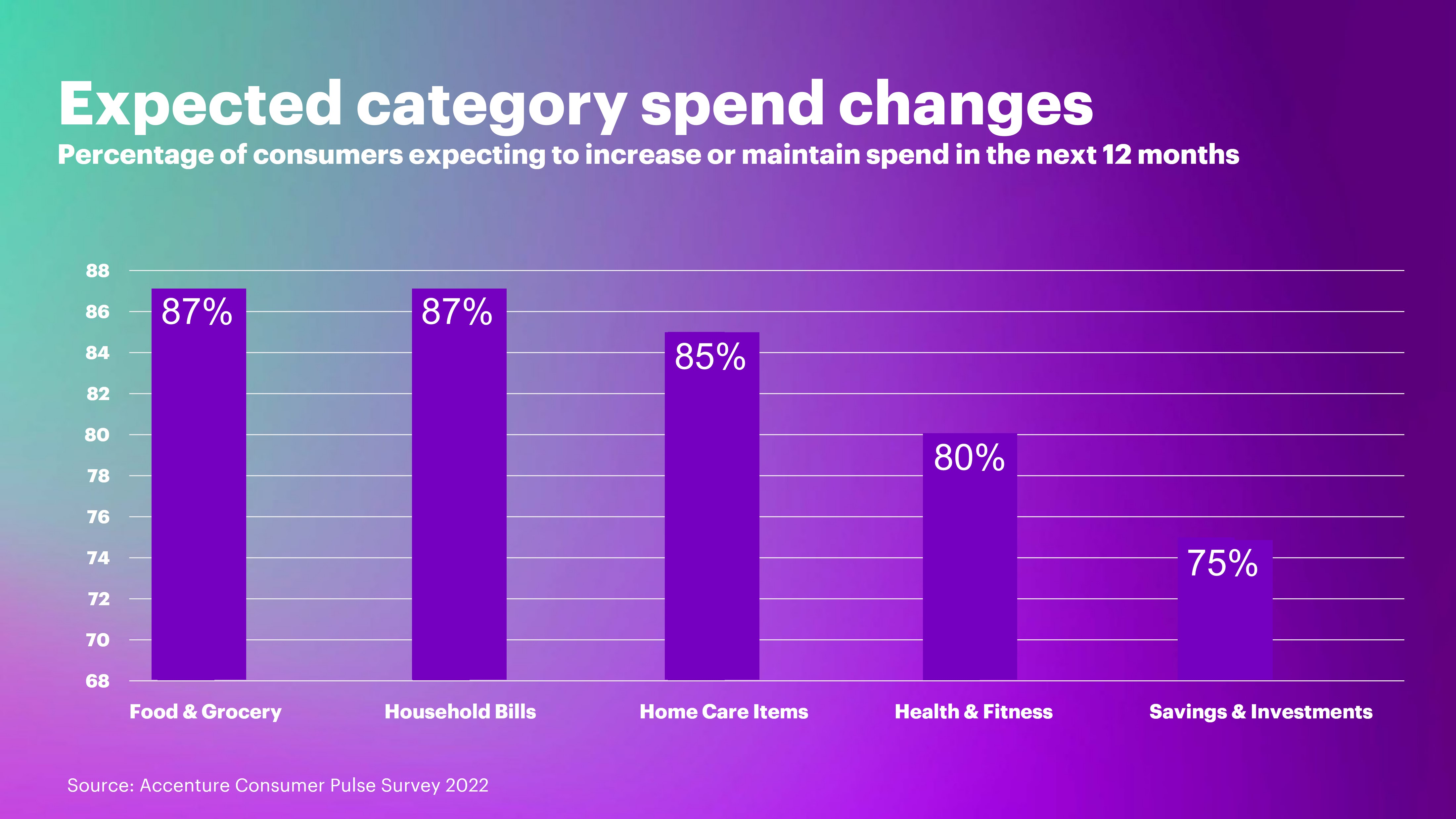 Image source: Accenture
Image source: Accenture
How Social Media Influences Gen Z’s Purchasing Decisions
Social media plays a profound role in shaping Gen Z’s purchasing decisions. Platforms such as Instagram, TikTok, and Snapchat have emerged as central hubs for interaction, inspiration, and ultimately, consumer behavior changes. The instantaneous nature of social media allows brands to connect with Gen Z in real time, leveraging influencers and user-generated content to build trust and rapport.
Influencer culture significantly impacts Gen Z’s shopping habits, as recommendations from relatable figures often outweigh traditional advertising methods. This demographic is more likely to purchase products that they have seen endorsed by influencers who resonate with their personal values or lifestyle choices. According to a recent study, over 50% of Gen Z claims social media influencers shape their buying decisions more than any other factor.
Moreover, social media facilitates peer validation—Gen Z frequently seeks approval from friends or online communities before making significant purchases. Platforms not only allow consumers to share their own experiences but also to solicit opinions and reviews from their networks, fostering a communal approach to shopping.
Brands that recognize the importance of establishing a strong social media presence and engaging authentically with their audience are more apt to resonate with Gen Z consumers. This cultural shift underscores the need for marketers to adapt their strategies to interact meaningfully, focusing on storytelling and authenticity rather than straightforward promotional tactics.
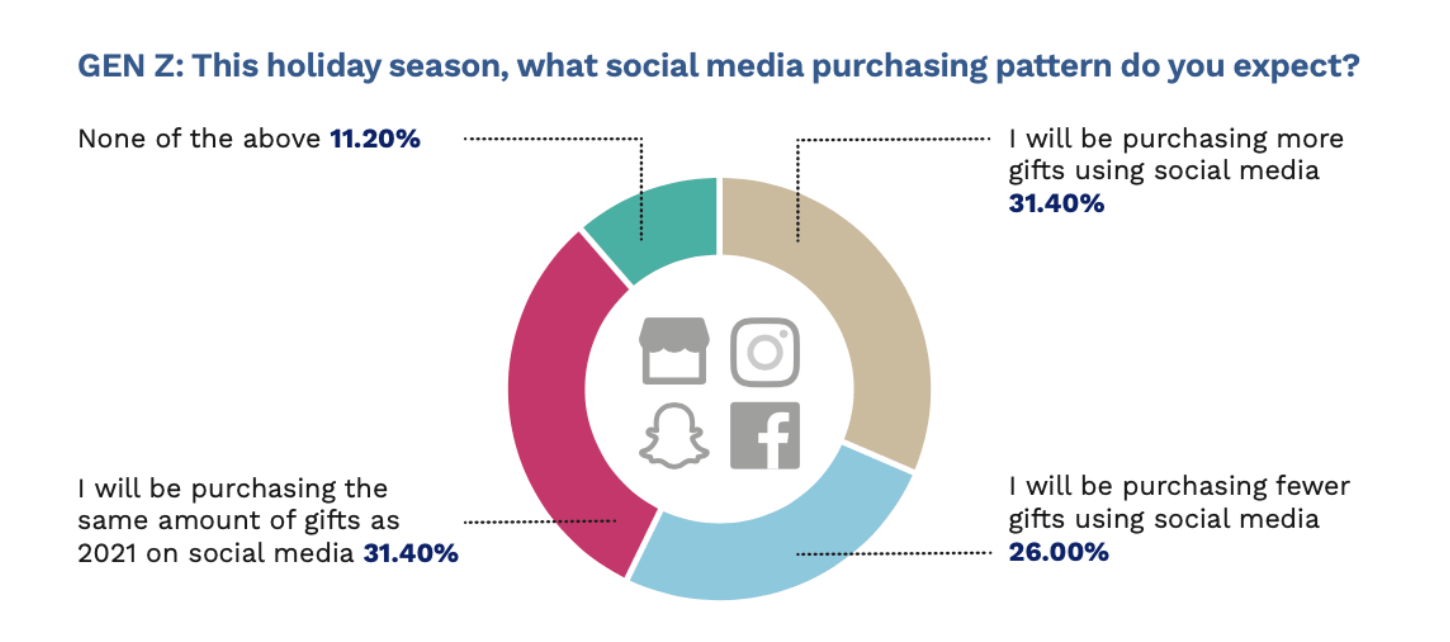 Image source: Source Name
Image source: Source Name
In conclusion, the intersection of social media and values-driven consumerism has reshaped the marketplace, compelling businesses to re-examine their approaches to capturing the loyalty of Gen Z consumers. By fostering environments that prioritize experiences and community engagement, brands can successfully navigate this evolving landscape.
The Bigger Picture: Wealth Trends Shaped by Gen Z in 2025
Gen Z’s Push for Financial Transparency and Inclusion
As Gen Z emerges as a powerful economic force, their demand for financial transparency and inclusion is reshaping the marketplace. Unlike previous generations, Gen Z places a high value on ethical practices and transparency in financial institutions. They are more likely to support brands that demonstrate a commitment to social responsibility and ethical governance. This generational mindset is pushing companies to rethink their strategies to remain competitive.
Statistics show that 80% of Gen Z individuals believe it is essential for companies to address social issues. This expectation drives them to seek out organizations that prioritize ethical values over profit margins. As a result, financial institutions are compelled to embrace transparent business practices, providing clear information about fees, terms, and the impacts of their financial products.
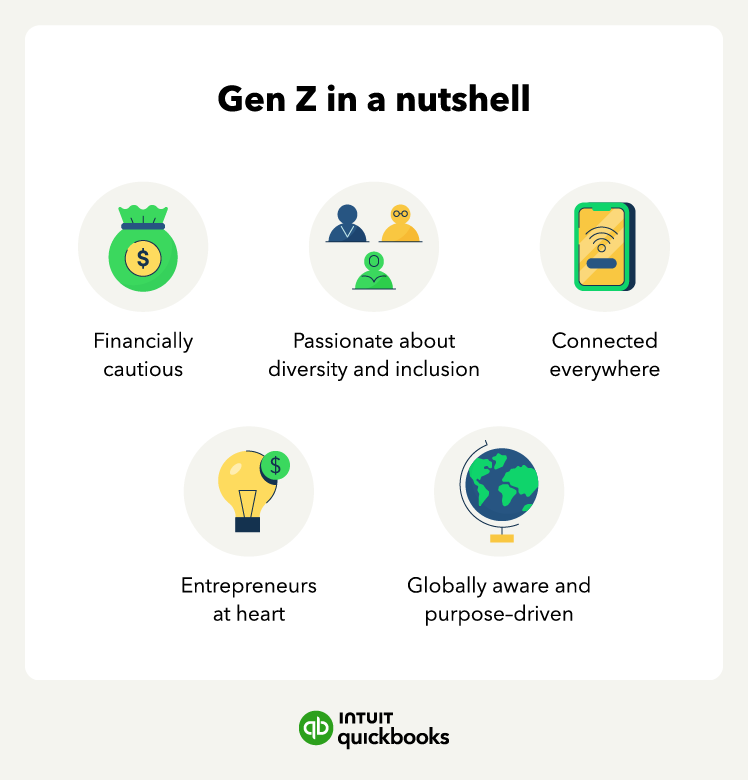 Image source: QuickBooks
Image source: QuickBooks
Furthermore, the rise of technology-driven financial solutions has made access to information easier than ever. Gen Z utilizes apps and online platforms to compare financial products, read reviews, and stay informed about their options. According to a report by Deloitte, a significant proportion of Gen Z feels more financially secure when they have access to educational resources and transparent information.
How Their Choices are Impacting Traditional Financial Systems
Gen Z’s growing influence is having far-reaching effects on traditional financial systems. Their preference for fintech solutions, such as payment apps and digital banks, challenges established banks and financial institutions to innovate continuously. As this generation prioritizes technology and user-friendly platforms, traditional banks face the reality of declining customer bases unless they adapt to the evolving landscape.
One major shift is the deterioration of the conventional branch model. Gen Z prefers digital access to their financial services, leading many banks to close physical locations in favor of online platforms. Notably, the vast majority of this generation choose to manage their finances via mobile apps, which provide more control and flexibility.
Additionally, Gen Z’s investment habits are further disrupting traditional finance. This generation is more inclined toward sustainable investing and impact-driven funds, which prioritize environmental and social governance (ESG). As awareness grows about climate change and social inequality, financial institutions are responding by developing products that align with these values.
In summary, the financial landscape of 2025 signifies that understanding and catering to Gen Z’s demands for transparency, inclusivity, and technology will be critical for any institution aiming to thrive in the evolving market. By embracing these shifts, traditional financial systems can position themselves for success in an increasingly competitive environment.
Conclusion: A Generation that Redefines Money and Wealth
In conclusion, Generation Z is not merely adapting to the evolving financial landscape; they are actively shaping it. This generation’s unique approach to money and wealth is characterized by a blend of technological savviness, innovative investing strategies, and a commitment to social responsibility. As they navigate their financial futures, they are setting the stage for a new economic paradigm.
Here are some key takeaways regarding how Gen Z is redefining money and wealth:
- Shift in Saving Habits: Unlike previous generations, Gen Z prioritizes saving with an awareness of their future goals. Their saving strategies leverage technology, employing apps and platforms that make financial management more engaging and efficient.
 Image source: SmartyPig
Image source: SmartyPig
- Innovative Investment Approaches: With a growing interest in cryptocurrency, stocks, and socially responsible investing, Gen Z is steering away from traditional investment methods. They seek platforms that promote inclusivity and transparency, reflecting their desire for greater financial equality.
 Image source: Prudent Corporate
Image source: Prudent Corporate
- Conscious Consumerism: Gen Z is leading a revolution that values experiences over possessions. Their consumer choices are heavily influenced by social media, where peer recommendations and authenticity play significant roles. This trend reflects their prioritization of meaningful products and ethical brands.
 Image source: Accenture
Image source: Accenture
- Impact on Traditional Financial Systems: As they advocate for financial transparency and the dismantling of outdated financial systems, Gen Z is pushing for a landscape where inclusion is paramount. Their preferences are driving changes that challenge the status quo, prompting established institutions to rethink their strategies.
In light of these transformative trends, it’s crucial for financial institutions and businesses to understand and adapt to the values and behaviors of Gen Z. As this generation continues to wield influence over economic practices, their commitment to innovation and inclusivity will likely leave a lasting imprint on the future of money and wealth. For further insights on how Gen Z is shaping the financial landscape, visit Pew Research Center.
